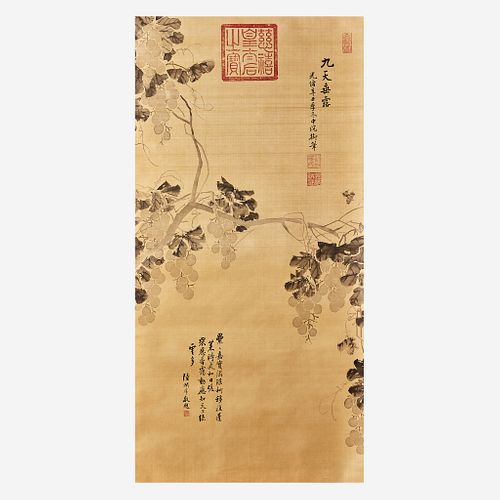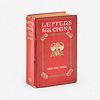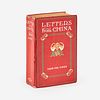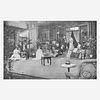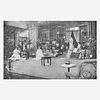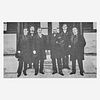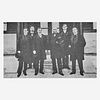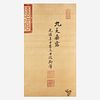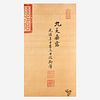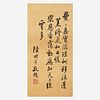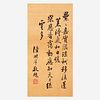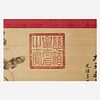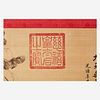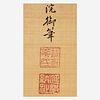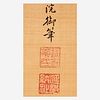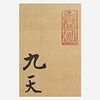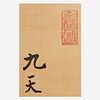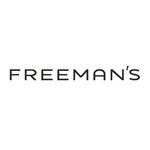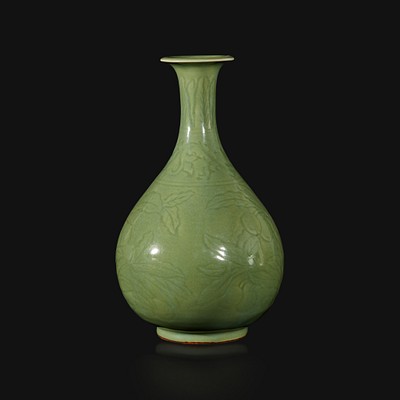Attributed to the Empress Dowager of China, Cixi (1835-1908)
About Seller
2400 Market St
Philadelphia, PA 19147
United States
Established in 1805, Freeman’s Auction House holds tradition close, with a progressive mind-set towards marketing and promotion, along with access to a team of top experts in the auction business. And now with offices in New England, the Southeast, and on the West Coast, it has never been easier to ...Read more
Two ways to bid:
- Leave a max absentee bid and the platform will bid on your behalf up to your maximum bid during the live auction.
- Bid live during the auction and your bids will be submitted real-time to the auctioneer.
Bid Increments
| Price | Bid Increment |
|---|---|
| $0 | $25 |
| $500 | $50 |
| $1,000 | $100 |
| $2,000 | $200 |
| $3,000 | $250 |
| $5,000 | $500 |
| $10,000 | $1,000 |
| $20,000 | $2,000 |
| $30,000 | $2,500 |
| $50,000 | $5,000 |
| $100,000 | $10,000 |
About Auction
Apr 8, 2021
Freeman's upcoming Asian Arts auction includes a selection of fine Chinese porcelains, including a rare Yongzheng 'Dragon and Waves' Meiping and a Longquan Celadon vase. Freeman's info@freemansauction.com
- Lot Description
JIUTIAN CHUILU (GRAPES)
A gift from the Empress Dowager to Congressman and Mrs. Edwin H. Conger
Ink on silk, mounted as a hanging scroll, titled and inscribed "Guangxu Xinchou Ji Dong Zhong Huan Yu Bi" ("Guangxu, Xinchou Year [equivalent to 1901-1902], Late Winter, Mid-Month; Imperial Brush") upper right and with four seals, inscribed again lower left with a poem signed Lu Runxiang, and with one seal; later Japanese style mounts, later wood box, accompanied by Sarah Pike Conger "Letters from China", Chicago, 1909 (2).
(H: 41 1/2, W: 21 1/2 in. (image); W: 40 in. (total width of roller bar))Provenance: Gift from the Empress Dowager of China, Cixi to Mr. and Mrs. Edwin. H. Conger
Thence by descent within the family
Note: While many works attributed to the Empress Dowager were painted by other court artists for the Empress Dowager, the present work may be one the few paintings by her hand.
The date this work was painted and the recipients are significant. United States Congressman Conger was appointed Envoy Extraordinary and Minister Plenipotentiary to the Imperial Court of China from 1898-1905.
During this time, virulent and reactionary anti-western forces within China coalesced, culminating in the "Boxer Rebellion" as it was known in the west, led by the Society of Righteousness and Harmony movement (Yihetuan Yundong). In June of 1900, the International Legation Quarter in Beijing was besieged by the Boxers, and Conger, his wife, family, other diplomats, missionaries and other targets of the Boxers endured daily military assault, fearing for their lives until the Eight Nation Alliance came to their rescue during the Battle of Beijing. These events were recorded in a series of letters by Mrs. Conger, who later published them in "Letters from China".
Sarah Pike Conger's letters also describes her growing friendship with the Empress Dowager, the flight of the Imperial Court to Xian to avoid capture by Western forces, and Cixi's return to Beijing on January 7/8 of 1902, just before this painting was created. A photograph of Mrs. Conger and other western ladies with the Empress Dowager is in the Freer Gallery of Art and Arthur M. Sackler Gallery Archives, FSA A13 SC-GR-249 (Illustrated in Daisy Yiyou and Jan Stuart et all, "Empresses of China's Forbidden City, 1644-1912, p. 47, fig. 12.)
"Letters from China" portrays Conger as one of the few westerners who believed in making efforts to get to know the Empress and members of the court to discover common ground with the Chinese, so that with greater familiarity and understanding, the Chinese may once again take their place among the nations of the world. Conger also clearly understood the indignities and challenges the Chinese had faced, as well as foreign fear and discrimination based on ignorance.
The title of this painting may be translated as "Heavenly Dew" or "Dewdrops from the Highest Heaven". On the surface, this may be seen as a poetic description of grapes, but the concept of dew from the ninth heaven has a deeper resonance in Chinese thought. The "Ninth Heaven" or "Nine Heavens" has been variously conceived as either the highest, most profound heights of the heavens, akin to the western empyrean, or the breadth of the sky (the center and all eight cardinal directions). It is probably the first which was referred to by the Tang dynasty poet, Li Bai in his famous poem Wanglushan pubu (Wanglu mountain waterfall), where he compares the waterfall to the Milky Way, falling from Jiutian (the ninth heaven).
The concept of "Heavenly Dew" also has ancient roots in Chinese culture, where dew was seen as a rarified substance, fit for divine beings. Special bronze vessels, Chénglùpán, (dew-collecting basins) were used to harvest dew, which seemed to magically appear overnight, thus Cixi's entitling of her painting extols the fruit as something surpassing the mundane and being fit for immortals. Grapes are also symbols of fertility and abundance, with the multitude of individual fruits in a single cluster conveying numerous descendants. Such a gift from the Empress Dowager, signifying prosperity and well-being, had particular meaning, given the events of the preceding months, and Cixi's efforts to build bridges with the representatives of Western nations.
The inscribed poem, may be translated as:
"The fruits come in crowds jostling each other, embellishing the jade-like vines.
This transplanted green plant brings harmony.
Basking in warm sunshine, the fragrance livened everyone's senses
Thanks to the gathering green clouds"
This was writen by Lu Runxiang (1841-1915), who served variously as Secretary at the Hanlin Academy, Chief Procurator, Chief Minister of Construction, Chief Minister, Imperial Tutor, Senior Imperial Secretary and First Imperial Secretary. During the court's soujourn in Xi'an, Lu served as speaker for Cixi and drafted her orders. His calligraphy was highly regarded.
Another "Imperial" painting, "Tree Peonies in Full Bloom", 1911, in the collection of the Art Institute of Chicago, also bears colophons by Lu. "Peonies" was a diplomatic gift from the Empress Dowager Longyu (1868-1913) to Mr. and Mrs. William C. Calhoun as they departed the Imperial palace in Beijing. Calhoun served as Envoy Extraordinary and Minister Plenipotentiary to China from 1909-1913. - Shipping Info
-
No lot may be removed from Freeman’s premises until the buyer has paid in full the purchase price therefor including Buyer’s Premium or has satisfied such terms that Freeman’s, in its sole discretion, shall require. Subject to the foregoing, all Property shall be paid for and removed by the buyer at his/ her expense within ten (10) days of sale and, if not so removed, may be sold by Freeman’s, or sent by Freeman’s to a third-party storage facility, at the sole risk and charge of the buyer(s), and Freeman’s may prohibit the buyer from participating, directly or indirectly, as a bidder or buyer in any future sale or sales. In addition to other remedies available to Freeman’s by law, Freeman’s reserves the right to impose a late charge of 1.5% per month of the total purchase price on any balance remaining ten (10) days after the day of sale. If Property is not removed by the buyer within ten (10) days, a handling charge of 2% of the total purchase price per month from the tenth day after the sale until removal by the buyer shall be payable to Freeman’s by the buyer. Freeman’s will not be responsible for any loss, damage, theft, or otherwise responsible for any goods left in Freeman’s possession after ten (10) days. If the foregoing conditions or any applicable provisions of law are not complied with, in addition to other remedies available to Freeman’s and the Consignor (including without limitation the right to hold the buyer(s) liable for the bid price) Freeman’s, at its option, may either cancel the sale, retaining as liquidated damages all payments made by the buyer(s), or resell the property. In such event, the buyer(s) shall remain liable for any deficiency in the original purchase price and will also be responsible for all costs, including warehousing, the expense of the ultimate sale, and Freeman’s commission at its regular rates together with all related and incidental charges, including legal fees. Payment is a precondition to removal. Payment shall be by cash, certified check or similar bank draft, or any other method approved by Freeman’s. Checks will not be deemed to constitute payment until cleared. Any exceptions must be made upon Freeman’s written approval of credit prior to sale. In addition, a defaulting buyer will be deemed to have granted and assigned to Freeman’s, a continuing security interest of first priority in any property or money of, or owing to such buyer in Freeman’s possession, and Freeman’s may retain and apply such property or money as collateral security for the obligations due to Freeman’s. Freeman’s shall have all of the rights accorded a secured party under the Pennsylvania Uniform Commercial Code.
-
- Buyer's Premium



 EUR
EUR CAD
CAD AUD
AUD GBP
GBP MXN
MXN HKD
HKD CNY
CNY MYR
MYR SEK
SEK SGD
SGD CHF
CHF THB
THB